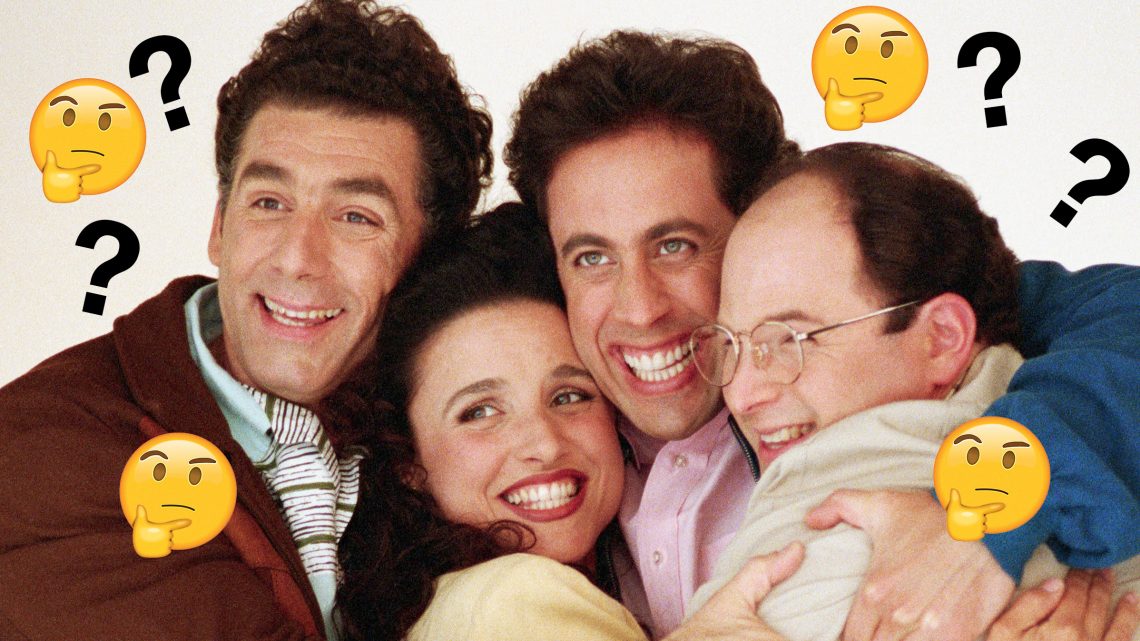
What’s the Deal with the ‘Seinfeld’ Characters’ Ages? An Investigation
December 18, 2018One of my earliest TV memories is of the Seinfeld finale. I grew up watching the show in syndication, and in high school worked at an ice cream store so I could afford the DVD sets of all nine seasons as they were released. The end of "The Marine Biologist" makes me cry because it's so perfectly constructed—the platonic ideal of a half-hour, four-story comedy program. I've eaten many times at the diner in Morningside Heights that features prominently in the sitcom. I'm not saying I'd win a Seinfeld trivia event, but I'd probably do better than most of you.
And yet, for all the minutiae I've retained about a show that piloted the year I was born and hasn't been on the air for 20 years, there's one seemingly basic fact I still don't know about it. Actually, it's so elementary that I was recently shocked upon realizing that it wasn't in my repertoire. Namely: How fucking old are the characters on Seinfeld supposed to be?
Growing up, I always assumed the core four Seinfeld characters were in their 30s or 40s—age ranges which I considered ancient, though now I recognize them as distinct phases of life. But as I've approached the floor of those ages myself, George, Jerry, Kramer, and Elaine still seem impossibly old. One Redditor described the phenomenon earlier this year: "no matter how hard I try to imagine it they will always appear 20 years older than me." What was up? Did the fact that bald-ass Jason Alexander was 29 years old when the pilot first aired lend the show's universe a certain chaotic energy that threw everything off? Did the characters have a static age, or were they written to always seem slightly older than the person viewing it, kind of like how the Mona Lisa was painted to always be looking at you no matter where you viewed it from? Is that even possible?
Hoping to get to the bottom of this, I called up Katie Kleiger, a comedian featured in a 2016 Hulu documentary about Seinfeld super-fans. "I'm the kind of nerd who actually knows how old they're supposed to be," she told me at the beginning of our chat. "I think the general idea is that they start in their early 30s, and they end in their late 30s. Elaine is the youngest, and Kramer is much older."
Mystery solved, right? Not really, because Kleiger didn't seem to have such a strong grasp on the ages herself: "You know, I've been watching this for such a long time, but now that I'm closer to their Elaine's age, it does seem weird," she said.
I'm 29, and Kleiger is a little younger than that. We started comparing notes. It was pretty realistic that Elaine would live with a roommate toward the beginning of the show if she was in her 20s, she said. But it was weird, I pointed out, that she never went out to parties or bars. Who is too old to go out but not old enough to live alone, even in New York? "All the woes and troubles that they have are so different from what you would expect someone in their 30s to be dealing with in New York," as Kleiger put it.
Part of the confusion could be chalked up to everyone, including Elaine, dressing like a dad on his day off, but I'm not buying that explanation. After all, 90s fashion is obviously back in style, and I'm not feeling the same kind of dissonance I feel when I walk down the street in Brooklyn as a I do while watching Seinfeld.
In search of a better answer, I called Matt Williams, the cohost of a podcast called Seincast. "When the show started there wasn't really any clear definition or answer as to their age," he told me. "And when we started to do the podcast, we noticed some inconsistencies early on, especially given that Jerry and George were assumed to be lifelong friends."
For instance, in one episode Jerry would say he was 37, and then in another George would say he was 33. But in season four's "The Outing," an NYU student writes an article assuming that the two are a couple, and in that episode we get some clear verification that they met in gym class at school. So the question is: Is George older than he says, or is Jerry younger than he says? (The show is basically about them being pathological liars, so it's possible one or both of them aren't being truthful.)
Although Williams is one of the world's foremost experts on Seinfeld, he says that he just kind of splits the difference between the actors's ages. In the episode about Jerry's long-outstanding library book, the comedian claims he returned it in 1971. Doing some back-of-the-napkin math on that, and presuming that Jerry was an 18-year-old high school senior at the time, and given that the show piloted 18 years after 1971, it would put him at about 35. That number gets further credence because it was Jerry Seinfeld's actual age when the pilot filmed.
That wasn't enough for me as someone who's seen a million teen movies with 35-year-old actors and about as many rom-coms where a 20-something starlet plays a matronly figure. There's a clear difference between a character's age and an actor's. One is canon; one is not. One would have me believe that the Fonz was 39 years old. Fuck right off.
"I think you might be giving the writers a little too much credit in terms of foresight," Williams told me of my quest. "Nobody knew what the show would become so people might not cared much about their ages beyond them being single people in their 30s."
I decided then to do the only thing that could solve this once and for all, which was call up one of the writers. Peter Mehlman—the legendary TV maestro who worked on Seinfeld for almost the entirety of its run—was kind enough to indulge my stupid line of questioning over the phone.
I was already pretty sure that I'd figured out the reason I found the mystery of the Seinfeld characters's ages so perplexing. I may just be a degenerate, but if you're trying to tell me that I'm supposed to accept that there could be a group of young (even young-ish) New Yorkers who didn't drink or go out and didn't talk about not drinking and going out endlessly and annoyingly, I would tell you Westworld requires less suspension of disbelief. "When the show came out, they were acting like old men," Williams said. "They go to the coffee shop and the bodega. There's no youthful energy. It is bizarre how they live their social lives as people who aren't married and don't have kids."
"They're misanthropes," Kleiger responded when we tried to unpack this. "I can't imagine them going out." He had logical answers for why they lived the way they did. Jerry was a comedian, he explained, so there were no coworkers for him to go out with, and he did hang out with certain other comedians, like Kenny Bania, whom he despises. You see George in a bar after he loses his job. Elaine goes to a baseball game. "I think the Friends people were much more confined to the six of them and their dates and there was literally no one else in the world," Mehlman said. "We were dealing with so much—every issue in the world was kind of subtly dealt with from OJ to abortion to the AIDS Walk."
We also discussed some of the inconsistencies throughout the show. There was an episode in the final season about Frogger, which George and Jerry claimed to play in high school en though it didn't come out until 1981. That would make them around 26 in the pilot, which would make all of this even more insane. Mehlman, who didn't work on that season, said that by then the show had been infiltrated by fresh-out-of-Harvard writers, who brought cultural references that people such as himself didn't have (and that the original incarnations of the characters wouldn't have had either).
Although Mehlman said that Jerry and George were "probably 35" at the beginning of the show, I was apparently missing the point if I thought this stuff mattered. I remain convinced that my theory about why they seem old is right, but then again, how can you accurately assess the ages of characters who show no emotional growth over nine years of television? The show was famously about nothing, but it was also about everything. Time is literally a flat circle in the Seinfeld universe. The characters never age because they are ageless archetypes—asking how old George Costanza is not dissimilar to asking what birthday Mars, the Greek god of war, is celebrating. Geographical space was apparently irrelevant, too, according to Mehlman.
"I even kind of disputed that the show is very New York-based, because I think if you looked at your ten favorite episodes, they could have taken place in Seattle," he said. "The show is about a comedy of manners—just little quirks. That's what the show was about."
Follow Allie Conti on Twitter.


